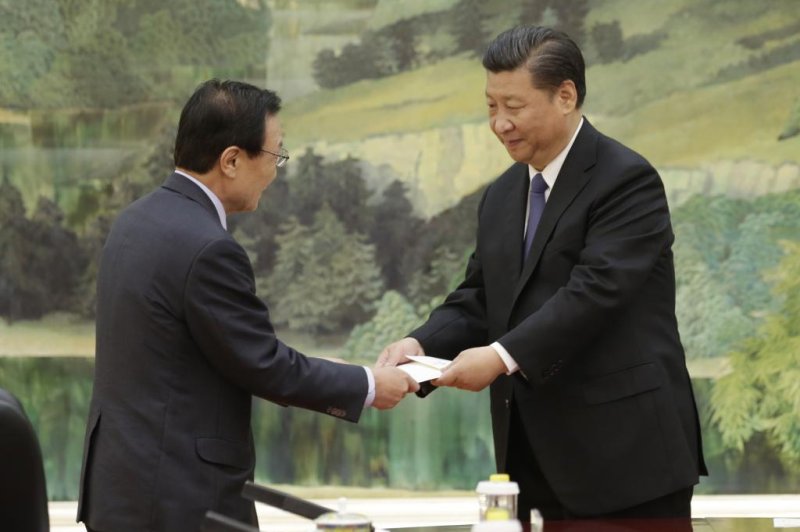South Korean special envoy Lee Hae-chan (L) passes on a handwritten letter from South Korean President Moon Jae-in to Chinese President Xi Jinping on Friday at the Great Hall of the People. Photo by Jason Lee/EPA/Pool
May 19 (UPI) -- Chinese President Xi Jinping called for bilateral relations with Seoul to return to the "right track" during a meeting with South Korean special envoy Lee Hae-chan, as other Chinese officials said they would take steps to "ease THAAD sanctions" against Seoul.
The meeting demonstrated a willingness on both sides to improve relations, and Seoul's interest in pursuing a more independent defense policy.
Xi welcomed Lee at the Fujian Room in the Great Hall of the People, where Lee delivered a letter from newly elected President Moon Jae-in, South Korean news service EDaily reported Friday.
Hopes are rising in Beijing that Seoul would reconsider the deployment of U.S. missile defense on the peninsula since Moon was elected.
The South Korean leader had pledged to review the hasty deployment of THAAD at a golf course in central South Korea. Moon's position is viewed favorably in Beijing, where suspicion remains the missile defense system could be used to monitor the Chinese military.
Lee said the meeting was productive, according to the report.
"The Chinese side requested us to not avoid the THAAD issue but address it directly," Lee said. "I said I am aware THAAD is of concern to the strategic security interests of China, and that the Korean government will find a solution to the matter in a genuine manner."
Lee also said Chinese officials were worried THAAD would open the way for increased U.S. military buildup on the peninsula and that they were concerned a larger network of U.S. missile defense would be subsequently deployed.
The South Korean envoy said in response Seoul is instead looking into building a self-developed missile defense system, a statement that echoes an earlier remark from Moon regarding the country's military future.
More South Koreans have become wary since U.S. President Donald Trump had said Seoul should pay $1 billion for THAAD after it was already in operation.
Relations between China and South Korea deteriorated quickly after July 2016, when former President Park Geun-hye agreed to deploy the missile defense system.















